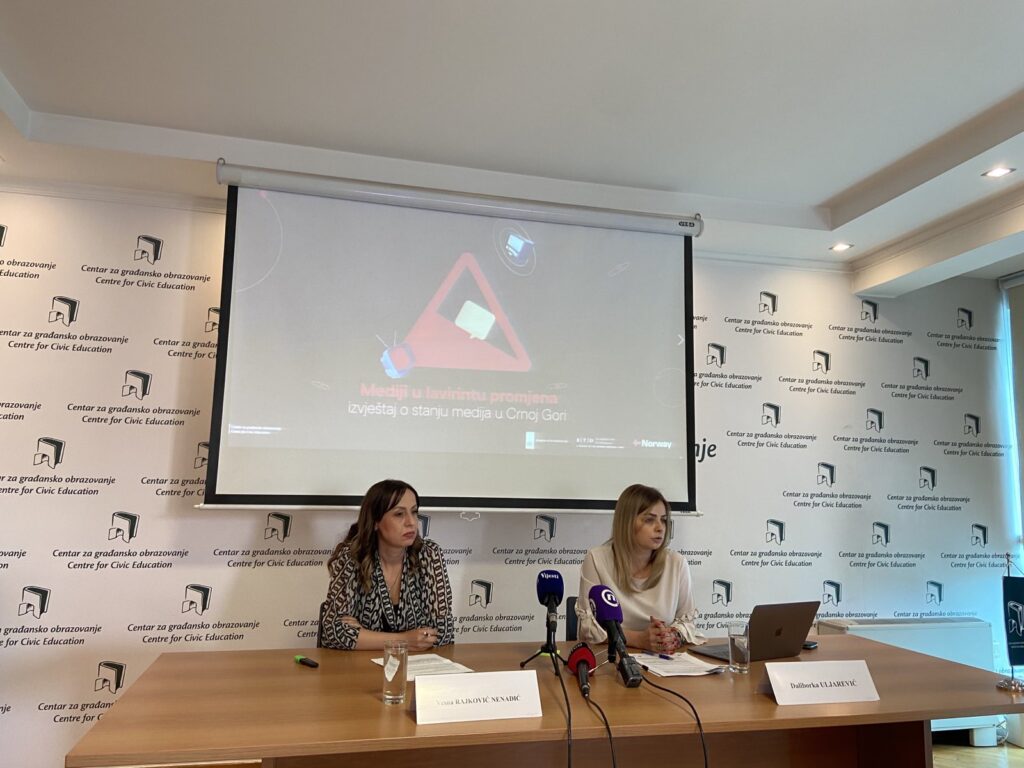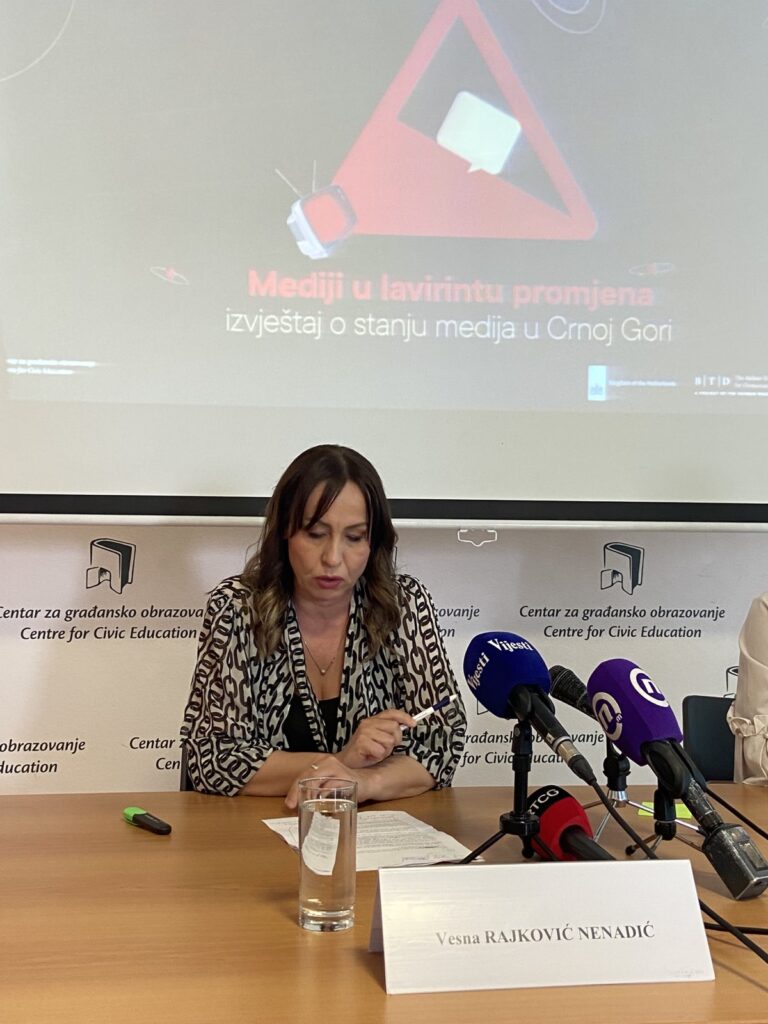The media scene in Montenegro remains deeply polarized and widely politicized, under the shadow of unresolved attacks on journalists and media property, insufficiently transparent and competitive public funding systems in practice, weak self-regulation and selective regulation, with RTCG that fails to make progress towards transformation into genuine public service of all citizens. To this should be added underdeveloped media literacy with growing and unregulated influence for the responsibility of the content on social media, some are key findings of the report on the state of media in Montenegro “Media in the labyrinth of change“, presented today at the Centre for Civic Education (CCE).
“The media in Montenegro undoubtedly operate in challenging conditions, which is an objective burden and, in this segment, a greater synergy of institutions, Montenegrin and international organizations and the media is needed to change the environment for the better. However, there are also noticeable problems in the part of professional reporting and respect for media standards, journalists and media outlets bear the key responsibility for that part”, said at the presentation Daliborka Uljarević, Executive Director of the CCE.
She also pointed out that the legislative framework for the work of the media is to the great extent good, noting that certain interventions are needed in the Law on Media, especially in the part of valid media records, protection of citizens’ rights in relation to comments at portals, but also removal of self-regulatory bodies from the Budget “because funding of such bodies by the executive makes the concept of self-regulation meaningless“, she stated. She also said that the Law on RTCG did not ensure the independence and plurality of the RTCG Council and that this should be addressed as a matter of priority in the upcoming amendments to this text.
Uljarević also reminded of the concerning data on attacks on journalists and media property. “In 2021, we are recording 21 attacks on journalists. It is a reflection of the extremely bad climate in society, full of tensions, which obviously has a stimulating effect on those who see journalists as targets, especially when they open unpleasant topics in relation to formal or informal powerful people, but also impunity for previous attacks. It is good that the amendments to the Criminal Code have tightened the penalties for attacks on journalists, but further practice in prosecuting attacks will be crucial“, Uljarevic noted.
She also emphasized the responsibility of the media themselves for the insufficient practice of self-regulation, emphasizing that one should not insist on a single self-regulatory body in the Montenegrin context. “However, we should insist on the application of the Code of Journalists of Montenegro, and ombudspersons within the media can be equally effective if they do their job diligently and proactively when necessary, and of course provided that the media within the ombudsman operates and uses that mechanism as its corrective”, said Uljarević, highlighting that mode of work of Paula Petričević, the ombudswoman of Vijesti, can be a model for other ombudsmen as well.
Vesna Rajković Nenadić, the main author of the report, gave an overview of the work of the Agency for Electronic Media (AEM). “Formally, an independent regulator fails to achieve full independence, impartiality and non-selectivity in its work”, she assessed, recalling the different views on the (il)legal election of AEM directors, but also the position of individual members of the AEM Council.
“In 2020, the Agency issued 110 warnings, of which 88 ex officio and 22 on the basis of complaints. The number of warnings during 2021 is significantly higher – 149, of which 127 ex officio and 22 based on complaints, which is positive in the current situation“, made it clear Rajković Nenadić. She also pointed out that “AEM did not react adequately for years to prevent the broadcasting of content from regional media houses in which controversial speech was spread, but also in cases when the most low-level insults of labeled personalities were recognized as opponents of the then government. The first measures of such significance, and in the suppression of hate speech, were recorded only in 2020, and intensified this year when AEM, in January, decided to ban the broadcasting of four Serbian TV shows Happy on the territory of Montenegro in the next six months”, she stated.
When it comes to the RTCG, Rajković Nenadić reminded of the numerous controversies that followed the election of long-term activist Boris Raonić as the director of RTCG, and which refer to accusations of conflict of interest of some members of the RTCG Council.
“Some contradictory decisions of the Agency for the Prevention of Corruption are also interesting when it comes to the conflict of interests of the directors of AEM and RTCG“, said Rajković Nenadić.
Furthermore, Rajković Nenadić pointed out the reports of RTCG on certain issues, especially regarding the Russian aggression on Ukraine.
“On the day of the enthronement of the Serbian Orthodox Church Joanikije in Cetinje, in the midst of protests and great tensions, the RTCG published the information that “the protesters shot at the police.” Neither the police nor RTCG, however, provided evidence for such claims”, she added.
In the context of inappropriate adjustment of the editorial policy of RTCG, she also cited the example when RTCG directly broadcasted the ceremony of the enthronement of the Bishop of Budimlja and Niksic of the Serbian Orthodox Church Methodius in Berane on the parliamentary channel. The broadcast was commented on by a person who is not employed in RTCG, and the President of Parliament, Aleksa Bečić, said at the time that the enthronement should not have been broadcasted on the parliamentary channel, stated Rajković Nenadić.
“RTCG is today not a genuine public service. We have simulated diversity, which may have quantitative but not a qualitative expression”, underlined Rajković Nenadić.
“Traditional media in Montenegro in the previous years, before the coronavirus pandemic, faced the problem of financial sustainability, and during the pandemic this problem was emphasized. The Government has provided financial assistance to the media on several occasions, and these procedures were mostly non-transparent and there is no official systematized data on the amount of assistance during the previous three years“, said Rajković Nenadić, presenting parts of the report on financial support to the media from the budget, with clarifications that it refers to subsidies for salaries, working capital loans, deferral of taxes and contributions to employees’ salaries, deferral of payments and exemption from part of AEM benefits or taking over debts to RDC, grants, etc.
CCE announced that it would soon publish a separate detailed report on the financing of the media from public funds.
Rajković Nenadić also referred to the issue of media literacy and accompanying challenges related to controversial content on social media and in comments on portals. “Social media, which are the least regulated area, have an increasing influence in Montenegro, and are recognized as an area where inflammatory and offensive speech is spreading. In the last few years, we have a growing trend of offensive speech in the online space, which often turns into hate speech, as well as the spread of misinformation and propaganda”, she said, assessing that “the competent state authorities have not adequately responded to these challenges.“
“Researches indicate that the legal provisions in the part of deleting controversial comments are not applied consistently and editorial teams must make additional efforts to provide expert moderators of comments,” said Rajković Nenadić, emphasizing that on social media, among other things, “there was an explosion of sexist and misogynistic speech.”
Criminal and misdemeanor protection must only be used exceptionally as a way to restrict freedom of speech, but it is necessary to ensure a balance between freedom of expression and protection of other human rights, it was underlined at the presentation.
The report is part of the project “Media for Me!”, implemented by the CCE with the support of the Embassy of the Kingdom of the Netherlands, the Ministry of Foreign Affairs of the Kingdom of Norway and the Balkan Democracy Fund of the German Marshall Fund (BTD).
Monika Mrnjačević, Programme associate



